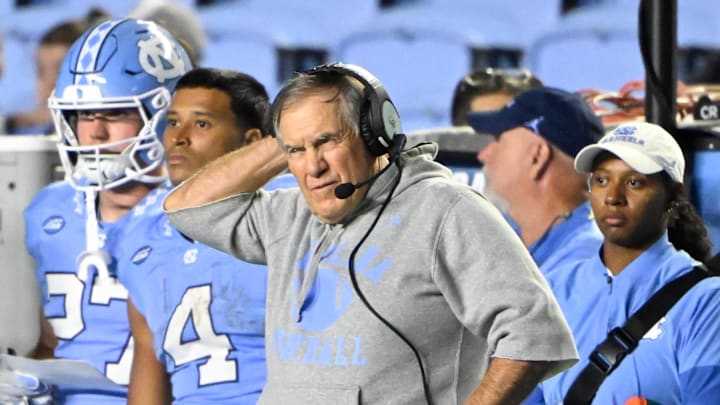There's this perception in football that coaching in the NFL is the pinnacle. Coaching in college football is a stepping stone or a fallback option. The best CFB coaches become the subject of rumors about every NFL opening; Jim Harbaugh is Exhibit A. When Bill Belichick couldn't find a new job in the NFL, he shrugged his shoulders and accepted a gig at UNC. I don't think he knew what he was getting into. In fact, I know he didn't.
The prestige of coaching in the NFL is certainly hard to beat. But that doesn't mean coaching in the NFL is easier than college football. In fact, I'd argue it's harder in CFB. Pro coaches don't have to wrangle 100 or so 18-to-22-year-olds, tough even on a good day. They don't have to worry about players going to classes. They aren't given limited hours to practice. They don't have to go into the living room of a 17-year-old and sell them and their family on joining their team. They don't have to worry about that same four-star freshman threatening to transfer on a whim. They don't have to piece their rosters together from nothing via the portal.
Belichick's first offseason with the Tar Heels was anything but peaceful. At least those distractions were mostly off-the-field concerns. His first game as a college football coach was an on-field disaster, though. TCU blew UNC away, 48-14. The Horned Frogs were 3.5-point favorites coming into Chapel Hill. They might as well have been 35-point favorites.
Yet, somehow, Belichick's most embarrassing moment of the week came after that loss, when John Middlekauff revealed that Patriots scouts were banned from UNC practices. That policy has since been confirmed by Ari Meirov and others.
Bill Belichick has never had to consider his players' futures before
You know what else NFL coaches don't need to worry about? The futures of their players. Sure, any decent human being would care about their players on some level. But the concern of an NFL head coach from a football perspective focuses solely on what a given player can do for their team. Their next steps are irrelevant. All those years, Bill Belichick wasn't preparing Tom Brady to win a Super Bowl with the Buccaneers. It only mattered what he achieved in New England.
That's not what it's like in college football. Winning a championship is the ultimate goal of any college head coach, but producing NFL players really does matter. Sending players to the league legitimizes you as a coach. It amplifies the power of your program. It makes it easier to recruit. Coaches go into those living rooms and sell the idea of development to the families. I'll get your son to the NFL. I've done it for others. Social media managers hype up their draft picks and NFL success stories for a reason.
Programs that are hostile to NFL scouts are pretty much unheard of, because being hostile to the pros is the equivalent of shooting yourself in the foot. Well, Belichick has a hole in his boot and a smoking gun in his hand.
Why? Maybe it's because of his bitterness with the Patriots organization since they ditched him. Maybe it's payback for Mike Vrabel's dismissive comment after Belichick's opening loss at UNC: Asked if it takes awhile to get a program going, Vrabel pointed to Urban Meyer winning his first 12 games at Ohio State.
To be honest, it doesn't really matter. This is just who Belichick is. He's petty and he's let his pettiness get in the way of his own success before. This shouldn't surprise anyone.
Can Bill Belichick teach himself some new tricks? Don't count on it
Unfortunately, this policy hurts Belichick's players more than anyone. This doesn't surprise me, either. Belichick has never been accused of being a players' coach. In New England, he was an authoritarian figure whose tight control on his team was forged through fear. He's never had to consider anything beyond his way. In the NFL, his way worked — until it didn't. To find success in college football, his way will have to undergo a drastic transformation that I, frankly, don't find possible for the 73-year-old to make.
Put simply: Belichick has to become the kind of coach who truly cares about his players. The kind of coach who — like the best example of an authoritarian CFB head coach, Nick Saban — recognizes that winning at the college level only comes from treating coaching as mentorship. The kind of coach who grits their teeth and lets the scouts have all the access they want because eyes on his players matters more than his personal distaste for one team or another. The kind of coach whose understanding of "tough love" doesn't ignore the bit about love.
